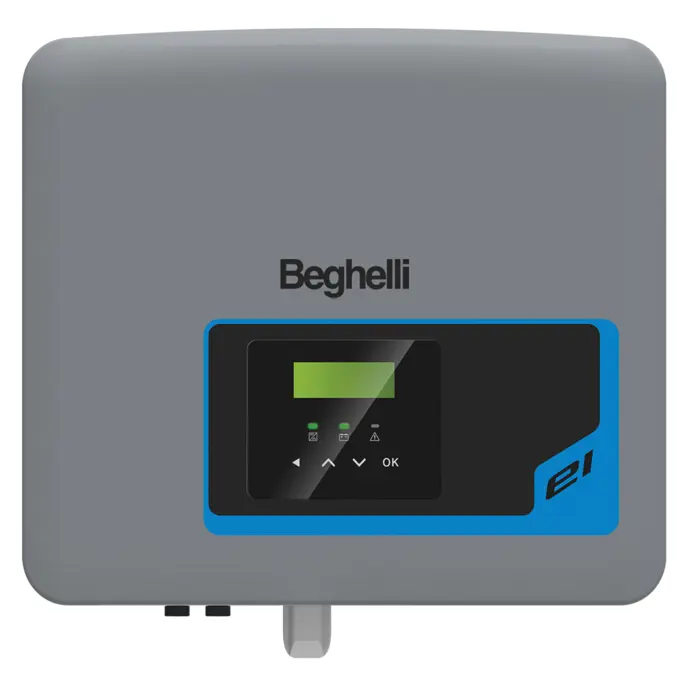Inverter solare ei-uno
Single-phase hybrid inverter with ON-GRID connection
The ei-uno hybrid inverter is the single-phase model for ON-GRID connection, specifically designed for residential applications, capable of managing up to 17.3kW with energy production and consumption monitoring via App and Beghelli cloud thanks to the integrated Wi-Fi module. Alternating current output for use of the energy supply in the event of a grid blackout.

FEATURES
- Grid-connected single-phase hybrid inverter (ON GRID) with battery storage management and EPS OFF GRID emergency function (disconnected from the grid)
- High battery charging and discharging efficiency of up to 97%.
- Management of up to 150% of nominal photovoltaic input power
- Low start-up voltage on the PV array side (higher utilisation of solar energy)
- MPPT optimisation function in case of PV array shading
- Operating temperature -35°C to 60°C (with derating above 45°C)
- Integrated SPD (overvoltage protection)
- CT (current meter) supplied
- Two inverters can be connected in parallel
- WiFi module included
- Web site and free monitoring APP
- Wall mounting brackets, cables and connectors included
|
3kW |
3.7kW |
6kW |
|
|---|---|---|---|
| Max. Input power of the photovoltaic field [Wp]. | 4500 | 5500 | 9000 |
| Max. Input voltage [V]. | 600 | 600 | 600 |
| Starting voltage [V] | 90 | 90 | 90 |
| Nominal input voltage [V] | 360 | 360 | 360 |
| MPP tracker voltage range [V] | 70-550 | 70-550 | 70-550 |
| Number of MPP trackers/Strings per MPP tracker | 2(1/1) | 2(1/1) | 2(1/1) |
| Maximum input currents (input A/input B) [A] | 16/16 | 16/16 | 16/16 |
| Maximum short-circuit current (input A/input B) [A] | 20/20 | 20/20 | 20/20 |
| 3kW | 3.7kW | 6kW | |
|---|---|---|---|
| Power rating AC OUTPUT [W] | 3000 | 3680 | 6000 |
| Rated current AC OUTPUT [A] | 14.4 | 16 | 26.1 |
| Max. Apparent power AC OUTPUT [VA] | 6300 | 3680 | 6600 |
| Max. Current AC OUTPUT [A] | 14.4 | 16 | 28.6 |
| Max. Apparent AC input power [VA] | 6300 | 7360 | 9200 |
| Max. AC input current [A] | 27,4 | 32 | 40 |
| Nominal AC voltage [V] | 220/230/240 | ||
| Rated mains frequency/mains frequency range [Hz] | 5/6 | ||
| Power factor adjustment range | 0.8 inductive to 0.8 capacitive | ||
| THDi (rated power) [%] | <2 | ||
| 3kW | 3.7kW | 6kW | |
|---|---|---|---|
| Battery type | Lithium Iron LiFePO4 Battery | ||
| Battery voltage range [V] | 80-480 | ||
| Maximum continuous charge/discharge current [A] | 30 | ||
| 3kW | 3.7kW | 6kW | |
|---|---|---|---|
| Nominal output power [W] | 3000 | 3680 | 6000 |
| Peak apparent power [VA, s] | 3600 | 4400, 60 | 7200, 10 |
| Maximum deliverable current | 13 | 16 | 26.1 |
| Rated voltage [V]/Frequency [Hz] | 230; 50/60 | ||
| THD with resistive load [%] | <2 | ||
| ON-GRID --> OFF GRID switching time in case of power failure | internal switch <10ms, external switch <100ms | ||
| Parallel operation | yes | ||
| 3kW | 3.7kW | 6kW | |
|---|---|---|---|
| Maximum efficiency [%] | 97.6 | ||
| Euro efficiency [%] | 97.0 | ||
| Battery charge/discharge efficiency [%] | 95.0/95.0 | ||
| Standby consumption [W] @Night | <3 | ||
| IP rating | IP65 | ||
| Operating temperature range [°C] | -35~+60 (reduced to 45°C) | ||
| Maximum operating altitude [m] | <3000 | ||
| Humidity [%] | 0-100 | ||
| Typical noise emission [dB] | <30 | ||
| Storage temperature [°C] | -40~+65 | ||
| Dimensions[WxHxD] [mm] | 482x417x181 | ||
| Weight [kg] | 24 | ||
| Inverter cooling mode | Natural convection | ||
| Communication interfaces | CT (current meter) / COM RS485 / BMS port battery connection (CAN, RS485) / CAN port (for connecting several inverters to each other) / port for WiFI module or Ethernet / USB for SW update / DRM (Demand Response Mode) port for control from network operator | ||
| 3kW | 3.7kW | 6kW | |
|---|---|---|---|
| Security | EN/IEC62109-1/-2 | ||
| EMC | EN61000-6-l/2/3/4;EN61000-3-2/3/n/12 | ||
| Certification | VDE4105 /G99 /G98/AS4777 / EN50549/ CEI 0-21 / CEI 0-16 / IEC61727 / RD1699/UNE 206007-1/NRS 097-2/VDE0124 | ||
- EPS: Emergency Power Supply, an output that is activated in the event of a blackout by supplying power to loads connected in AC at 230V, using battery energy, if available
- BMS: Battery Management System, electronic battery controller, incorporated in battery packs
- DRM: Demand Response Mode, standard and interface for possible control of the inverter by the public grid operator
